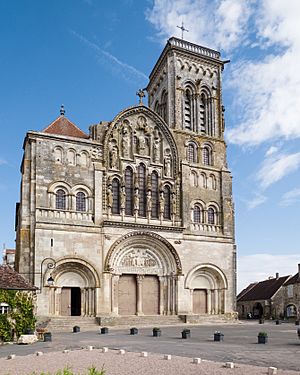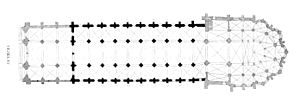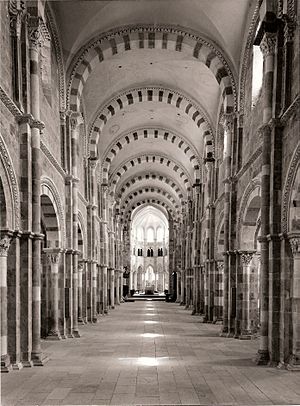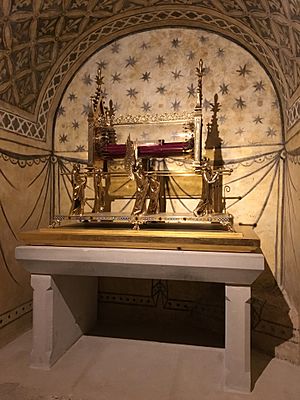Vézelay Abbey facts for kids
| UNESCO World Heritage Site | |
|---|---|

The beautiful abbey church in Vézelay, France.
|
|
| Location | Burgundy, France |
| Criteria | Cultural: i, vi |
| Inscription | 1979 (3rd Session) |
| Area | 183 ha |
| Buffer zone | 18,373 ha |
Vézelay Abbey is a famous old monastery located in the town of Vézelay in France. It was home to Benedictine monks, a group who followed special religious rules. The main church, now called the Basilica of Saint Mary Magdalene, was built between 1120 and 1150.
The church is a masterpiece of Romanesque art and architecture. This was a style popular in the Middle Ages known for its thick walls and rounded arches. The church is famous for its amazing sculptures on the doorways and pillars.
Over the centuries, the building faced hard times. It was damaged in 1569 during religious wars and was neglected for many years. It suffered more damage during the French Revolution.
Because of its amazing architecture and its importance to Christian history, the church and the hill it sits on were named a UNESCO World Heritage Site in 1979. Inside the church, visitors can see relics, or special objects, said to belong to Mary Magdalene.
Contents
History of the Abbey
How It All Began
The story of Vézelay Abbey starts a long time ago on land where a Roman house once stood. A nobleman named Girart of Roussillon founded the first monastery there. However, the early buildings were attacked and destroyed over the years.
In the 9th century, the abbey was rebuilt. It became a starting point for one of the main paths for pilgrims traveling to Santiago de Compostela in Spain. A pilgrimage is a special journey people take to a holy place.
The Relics of Mary Magdalene
Around the year 1050, the monks at Vézelay made an incredible claim. They said they had the relics (the physical remains) of Mary Magdalene, a follower of Jesus. They claimed the relics were brought from the Holy Land.
This news made Vézelay Abbey incredibly famous. People from all over Europe traveled to see the relics. Many believed that praying near the relics could lead to miracles. For example, prisoners who were freed would bring their chains to the abbey as a thank-you gift. The iron from these chains was melted down and used to make railings around the altar.
The money from all these pilgrims helped pay for the construction of the magnificent church we see today.
Building a Great Church
To handle the huge crowds of pilgrims, a new, larger church was started. It was officially opened on April 21, 1104. Building such a large church was very expensive. The high taxes made the local peasants angry, leading to a violent protest where the abbot (the head of the monastery) was killed.
The church was so popular that a large enclosed porch, called a narthex, was added in 1132 to give the crowds more space.
Famous Visitors and Events
Vézelay Abbey was at the center of many important historical events.
- In 1146, Saint Bernard of Clairvaux, a very influential church leader, gave a powerful speech at the abbey. He called for a Second Crusade, a military journey to the Holy Land.
- In 1190, two famous kings, Richard I of England (Richard the Lionheart) and Philip II of France, met at Vézelay. They stayed for three months before leaving to fight in the Third Crusade.
- In 1166, Thomas Becket, the Archbishop of Canterbury who was in exile from England, gave a famous sermon at Vézelay. He announced that he was punishing the main supporters of his enemy, King Henry II of England.
The main part of the church, called the nave, was badly damaged by a fire in 1165. It was rebuilt into the form it has today.
A Slow Decline
Vézelay's fame began to fade in 1279. That year, another body, also claimed to be Mary Magdalene's, was discovered in a town called Saint-Maximin-la-Sainte-Baume. This discovery was supported by a king, which made the new site very popular. Pilgrims started going there instead, and Vézelay became less important.
Saving the Abbey
By the 1800s, after the French Revolution, Vézelay Abbey was in ruins and in danger of collapsing. In 1834, a French official named Prosper Mérimée saw how bad the damage was and called for help.
A young architect, Eugène Viollet-le-Duc, was hired to lead a massive restoration project. From 1840 to 1861, he and his team carefully repaired the church. They replaced many of the damaged sculptures and even added new supports called flying buttresses to hold up the walls. Thanks to their work, the abbey was saved.
A Special Connection to the Sun
The builders of Vézelay Abbey were not just great artists; they were also skilled astronomers. In 1976, a fascinating discovery was made. The church was designed to align with the sun in a special way.
Every year on the summer solstice (around June 21st), the longest day of the year, something amazing happens. At noon, the sun is at its highest point in the sky. Sunlight shines through the high windows on the south side of the church, creating spots of light. These spots of light form a perfect path right down the middle of the floor. This shows just how carefully the medieval builders planned their work.
See also
 In Spanish: Basílica de Vézelay para niños
In Spanish: Basílica de Vézelay para niños
 | Mary Eliza Mahoney |
 | Susie King Taylor |
 | Ida Gray |
 | Eliza Ann Grier |




